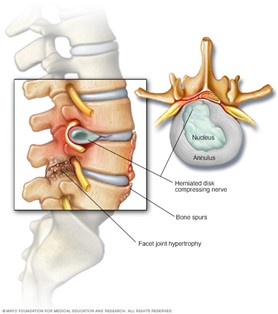Spinal stenosis is a narrowing of the spaces within your spine around the spinal cord and where the nerve roots exit to supply nerves to the rest of the body. This narrowing (stenosis) can put pressure on the nerves that travel through the spine. Spinal stenosis occurs most often in the lower back and the neck.
Spinal stenosis is most commonly caused by wear-and-tear changes in the spine related to osteoarthritis, but it can be due to trauma.
Types of spinal stenosis
The types of spinal stenosis are classified according to where on the spine the condition occurs. It’s possible to have more than one type. The two main types of spinal stenosis are:
- Cervical stenosis.In this condition, the narrowing occurs in the neck region of the spine.
- Lumbar stenosis.In this condition, the narrowing occurs in the part of the spine in your lower back. It’s the most common form of spinal stenosis.
Causes
Some people are born with a small spinal canal. But most spinal stenosis occurs when something happens to narrow the open space within the spine. Causes of spinal stenosis may include:
- Overgrowth of bone.Wear and tear damage from osteoarthritis on your spinal bones can prompt the formation of bone spurs, which can grow into the spinal canal. Paget’s disease, a bone disease that usually affects adults, also can cause bone overgrowth in the spine.
- Herniated disks are the soft cushions that act as shock absorbers between your vertebrae and they tend to dry out with age. Cracks in a disk’s exterior may allow some of the soft inner material to escape and press on the spinal cord or nerves. See picture below.

- Thickened ligaments.The tough cords that help hold the bones of your spine together can become stiff and thickened over time. These thickened ligaments can push into the spinal canal.
- Abnormal growths can form inside the spinal cord, within the membranes that cover the spinal cord or in the space between the spinal cord and vertebrae.
- Spinal injuries.Car accidents and other trauma can cause dislocations or fractures of one or more vertebrae. Displaced bone from a spinal fracture may damage the contents of the spinal canal. Swelling of nearby tissue immediately after back surgery also can put pressure on the spinal cord or nerves.
Risk factors
Most people with spinal stenosis are over the age of 50. Trauma, congenital spinal deformity such as scoliosis, and a genetic disease affecting bone and muscle development throughout the body can increase the risk of spinal stenosis.
Symptoms of lower back (lumbar) spinal stenosis include:
- Pain in the lower back. It may be a dull ache or tenderness to electric-like or burning sensation. Pain may come and go.
- Sciatica. This is pain that begins in the buttocks and extends down the leg and may continue into your foot.
- A heavy feeling in the legs, which may lead to cramping in one or both legs.
- Numbness or tingling (“pins and needles”) in the buttocks, leg or foot.
- Weakness in the leg or foot (as the stenosis worsens).
- Pain that worsens when standing for long periods of time, walking or walking downhill.
- Pain that lessens when leaning, bending slightly forward, walking uphill or sitting.
- Loss of bladder or bowel control (in severe cases).
Symptoms of neck (cervical) spinal stenosis include:
- Neck pain.
- Numbness or tingling in the arm, hand, leg or foot.
- Weakness or clumsiness in the arm, hand, leg or foot.
- Problems with balance.
- Loss of function in hands, like having problems writing or buttoning shirts.
- Loss of bladder or bowel control (in severe cases).
Symptoms of abdomen (thoracic) spinal stenosis include:
- Pain, numbness, tingling and or weakness at or below the level of the abdomen.
- Problems with balance.
Complications
Rarely, untreated severe spinal stenosis may progress and cause permanent:
- Numbness
- Weakness
- Balance problems
- Incontinence
- Paralysis
